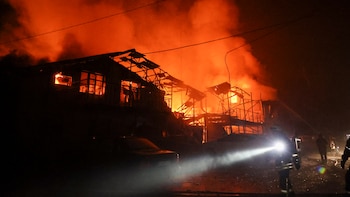
While waiting for the postponed awards ceremony of the figure skating team tournament, the first positive case in the anti-doping controls of the Beijing Winter Olympic Games was announced: the Iranian skier Hossein Saveh Shemshaki.
In a statement, the International Testing Agency (ITA) reported that a sample collected from Shemshaki had yielded an adverse analytical finding (AAR).
The unspecified substance is classified as an anabolic androgenic steroid included on the World Anti-Doping Agency (WADA) prohibited list.
The sample was collected by the ITA under the International Olympic Committee (IOC) results management and control authority during an out-of-competition doping control on February 7, 2022 in Beijing.
The result was reported by the WADA-accredited Beijing laboratory on February 9.
The athlete has been informed of the case and provisionally suspended pending resolution of the matter in accordance with the World Anti-Doping Code and IOC Anti-Doping Rules applicable to the Games.
This means that Shemshaki is barred from competing, training or participating in any activity during these Games.
The 36-year-old Iranian skier has the right to challenge the imposition of the provisional suspension before the Court of Arbitration for Sport - Anti-Doping Division (CAS ADD). He also has the right to request analysis of the B sample.
Shemshaki was one of Iran’s two flag bearers during the opening ceremony of the Games. He achieved his best result at the 2014 Winter Games in Sochi with 31st place in slalom.
The announcement of this adverse analytical result comes at a time when international media attention has momentarily shifted away from snow and ice to the closed-door “legal discussions” between the International Skating Union and the IOC regarding the awards ceremony for the figure skating team competition.
“Yesterday a situation arose at short notice, which requires legal consultation with the IOC,” the ISU press service said on Wednesday according to Russia’s TASS news agency.
Originally, the ceremony was supposed to take place on Monday evening, then it was delayed another day. The unknown legal problem has forced another indefinite postponement.
IOC spokesman Mark Adams said that “everything is being done to get the situation resolved as soon as possible, because we have medal-winning athletes involved.”
In that tournament, Russian skaters won the gold medal with 74 points, followed by the United States with 65 and Japan 63.
The Russian press has devoted numerous spaces to the uncertainty surrounding the pending awarding of the skaters.
In this context, the Russian television station Match TV stated that the International Figure Skating Federation is considering the possibility of a gradual increase in the age limit in that sport, from 15 to 17 years old.
The ISU Council has proposed, according to that media outlet, to leave the entry age for adult competitions in all disciplines unchanged (from 15 years old) next season and to start raising it from the 2023/24 season to 16 years old, and from the 2024/25 season to 17 years old.
As in the current rules, the skater must reach the required age by July 1 of the current year, MatchTV noted, according to RIA Novosti.
Últimas Noticias
Sinner-Alcaraz, the duel that came to succeed the three phenomenons
Beyond the final result, Roland Garros left the feeling that the Italian and the Spaniard will shape the great duel that came to help us through the duel for the end of the Federer-Nadal-Djokovic era.
Table tennis: Brazil’s Bruna Costa Alexandre will be Olympic and Paralympic in Paris 2024
She is the third in her sport and the seventh athlete to achieve it in the same edition; in Santiago 2023 she was the first athlete with disabilities to compete at the Pan American level and won a medal.

Rugby 7s: the best player of 2023 would only play the medal match in Paris
Argentinian Rodrigo Isgró received a five-game suspension for an indiscipline in the circuit’s decisive clash that would exclude him until the final or the bronze match; the Federation will seek to make the appeal successful.

Rhonex Kipruto, owner of the world record for the 10000 meters on the road, was suspended for six years
The Kenyan received the maximum sanction for irregularities in his biological passport and the Court considered that he was part of a system of “deliberate and sophisticated doping” to improve his performance. He will lose his record and the bronze medal at the Doha World Cup.

Katie Ledecky spoke about doping Chinese swimmers: “It’s difficult to go to Paris knowing that we’re going to compete with some of these athletes”
The American, a seven-time Olympic champion, referred to the case of the 23 positive controls before the Tokyo Games that were announced a few weeks ago and shook the swimming world. “I think our faith in some of the systems is at an all-time low,” he said.





